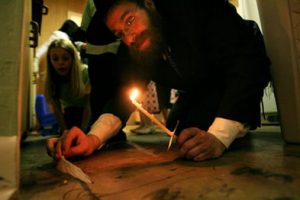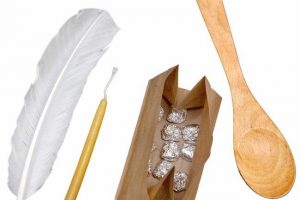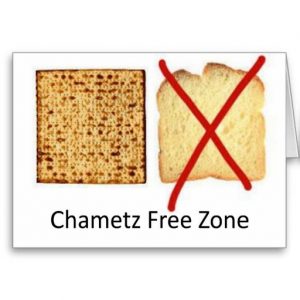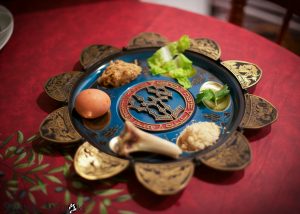Of Wooden Spoons, Feathers & Hide & Go Seek:
Were someone to -on any other night of the year- invite you over to their house and tell you in advance that you’d be playing a game of hide and go seek in the dark with a wooden spoon, a candle, a feather, and for good measure with some aluminum foil, mistama you would think him at least a shtikel weird, and zicher someone in need of psychological help in dealing with his fetish and other deviant behavior. Would you go? Mistama not! Ober that’s exactly what most orthodox Yiddin the world over will be doing in a few hours: the candle/spoon chomatze (leaven) games begin shortly: shut the lights!
 As you well know, we are commanded (by our rabbis) to make the proper hachonis (preparations) in advance of Pesach when all chomatze -even the tiniest crumb is forbidden, and later this evening (the night of the 14th of Nissan) we are implored to conduct the great “chomatze hunt.” What the hec is a chomatze hunt, or search, and why does it involve tools and toys more typically associated with strange predilections and efsher a sadomasochistic act we typically read about in magazines purchased (decades back of course) in a brown bag and snuck into our homes? That question was on the Oisvorfer’s mind as he unpacked this year’s version of the “chomatze kit” sent in -free of charge- without solicitation by some yeshiva seeking a hefty donation. Why do we do this? Why are these toys/tools employed? Why, after a thorough cleaning of the house by the shiksa housekeeper(s), are we still required to lay out -or hide- some chomatze -typically in the form of bread -though bi’D’eved (as a second option), cake and cookies might be acceptable, and then go seek them? And a few more questions: why do most people sprinkle about davka (specifically) 10 pieces of bread or challah? Is this but a minhag (custom)? Or, is this the din (rule of law)? Do all agree on that number? Is whole wheat a good substitute? Gluten free?
As you well know, we are commanded (by our rabbis) to make the proper hachonis (preparations) in advance of Pesach when all chomatze -even the tiniest crumb is forbidden, and later this evening (the night of the 14th of Nissan) we are implored to conduct the great “chomatze hunt.” What the hec is a chomatze hunt, or search, and why does it involve tools and toys more typically associated with strange predilections and efsher a sadomasochistic act we typically read about in magazines purchased (decades back of course) in a brown bag and snuck into our homes? That question was on the Oisvorfer’s mind as he unpacked this year’s version of the “chomatze kit” sent in -free of charge- without solicitation by some yeshiva seeking a hefty donation. Why do we do this? Why are these toys/tools employed? Why, after a thorough cleaning of the house by the shiksa housekeeper(s), are we still required to lay out -or hide- some chomatze -typically in the form of bread -though bi’D’eved (as a second option), cake and cookies might be acceptable, and then go seek them? And a few more questions: why do most people sprinkle about davka (specifically) 10 pieces of bread or challah? Is this but a minhag (custom)? Or, is this the din (rule of law)? Do all agree on that number? Is whole wheat a good substitute? Gluten free?
According to the Achroin (more recent commentator who seems well versed), Wikipedia, and a few other sources, the game of Hide & Go Seek dates back to the 2nd century, whenever that was. Ober is that emes? Mistama not! Seemingly it harks back to earlier generations, to a time the holy books call the era of the Chasidim Ho’ri’shoi’nim (first Chasidim) who looked carefully at the words of the heylige Toirah which tell us very explicitly not to own, enjoy, or even see, chomatze during the entire Pesach and shoin. How the chomatze hunt evolved over the years and how it came to include the wooden spoon and feather, along with the placement of as many as 10 pieces of bread followed by the ensuing search while holding a lighted candle, ver veyst? Is a candle really necessary in 2018? Is the participant disqualified if caught using a flashlight? And just what purpose does that wooden spoon serve?
 Shoin, as a public service to his readers the Oisvorfer did some research, studied numerous folios of the heylige seforim (holy books) and also spoke to a number of Yiddin to find out if they share similar practices? Does one commit a sin if he did not play hide-and-go-seek with the bread? Is the spoon then immediately put to use as corporal punishment is meted out? The emes is that the Oisvorfer remains traumatized -decades later- as he recalls being schmeissed -more than once- by that seemingly ubiquitous wooden spoon. Such trauma zicher played a role in his (arrested) development; that for another day. Can one play the game with pieces of salami? Certainly, we all know a rebbe -a wayward one- or two, who loved playing this game of hide the salami with their chosen victims..err, we meant students. Is one yoitze (does one fulfill) the obligation of hiding and seeking by placing fewer than 10 pieces? What if he hid fewer, or none? Oy vey!
Shoin, as a public service to his readers the Oisvorfer did some research, studied numerous folios of the heylige seforim (holy books) and also spoke to a number of Yiddin to find out if they share similar practices? Does one commit a sin if he did not play hide-and-go-seek with the bread? Is the spoon then immediately put to use as corporal punishment is meted out? The emes is that the Oisvorfer remains traumatized -decades later- as he recalls being schmeissed -more than once- by that seemingly ubiquitous wooden spoon. Such trauma zicher played a role in his (arrested) development; that for another day. Can one play the game with pieces of salami? Certainly, we all know a rebbe -a wayward one- or two, who loved playing this game of hide the salami with their chosen victims..err, we meant students. Is one yoitze (does one fulfill) the obligation of hiding and seeking by placing fewer than 10 pieces? What if he hid fewer, or none? Oy vey!
Shoin: As it turns out, the search for chomatze is taken seriously ober why? Nu, let’s learn what a few had to say about this rather bizarre -especially in our times of electricity, mini vacuums, and above all shiksas- custom. Says the AriZal, he most known -as we have shared with you in the past- for the coldest mikveh (ritual bath) in the world (over in Tzfat, Israel) azoy: the reason we place 10 pieces of bread and then go search for them is a great secret! In other words: it’s none of your business to know why: stop asking! Just follow the traditions handed down by your father, grandfather, and grandfathers all the way down the line back to Moishe Rabaynu. And if you believe that our three forefathers (just love how that reads) performed every mitzvah in the heylige Toirah though it was only given hundreds -many- of years later, you are blessed for following in the traditions of Avrohom, Yitzchok and Yaakov. So, why not?
The bottom line: there is zicher a minhag to scatter and hide 10 piece of chomatze (typically bread) to be found during the bidika (search). That minhag stands notwithstanding the fact that we either clean our houses, or have outside help getting them cleaned. In other words: though our houses are chomatze free before the search, we search anyway. Ober, and as expected, others (Halichos Shlomo) maintain that it’s not necessary to intentionally place chomatze around the house in advance of the search notwithstanding that one begins the search by making a brocho on the burning of the chomatze to be found. In other words: though one made a blessing on the burning, what he had in mind was to burn only what he finds. Didn’t find any? No problem!
Ober says the RemA quoting the Mishneh Birura (432:13), azoy: we do place and hide the chomatze davka because one made a brocho and in order for the blessing not to have recited in vain (brocho livatulo, not be confused with something else we do livatolo, if you chap), we make sure there is chomatze to be found. Case closed? Not! Why not? Because says the Taz: it’s not a good idea to hide chomatze around the house. Why not? Because one or more of those pieces may be misplaced. In that case, the chomatze will be in one’s possession and one may come across it during the holiday and violate the prohibition of not seeing chomatze during Pesach. Oy vey and rachmono litzlon (heaven forbid)!
 Ober says the Chok Yaakov (432:13): it’s ok to hide the chomatze even though one may forget and misplace it during the search. And why is that: because he urges people who may have forgotten and misplaced a piece or two, not to give up and to keep searching until the chomatze is found. Shoin and veyter.
Ober says the Chok Yaakov (432:13): it’s ok to hide the chomatze even though one may forget and misplace it during the search. And why is that: because he urges people who may have forgotten and misplaced a piece or two, not to give up and to keep searching until the chomatze is found. Shoin and veyter.
Ober, why davka 10 pieces. Is a minyan (quorum) required? Shoin: There too we have different opinions cited on why 10 is the accepted number. Says one source: it all harks back to Homon and Purim? Homon? What the hec is he doing in our Pesach story? What does Purim have to do with Pesach? Shoin: leave it to the creative minds of our sages of yesteryear, one of whom said azoy: If you recall the story of Purim, Homon, concocted a nefarious plot to wipe out all the Jews. The Migillah discusses the books Homon wrote giving orders for the Jews in all the countries under the rule of King Achashveyroish to be murdered. Ober who wrote these books? Seemingly, Homon only dictated them but they were authored by Homon’s 10 sons. Incidentally, these books (seforim), according to informed sources, were written on the 13th day of Nissan. Avada you recall that as the story infolded, and after Esther came in touch with the king’s scepter, if you chap, that Homon’s sons too were hung. To recall that great miracle and turn of events, we place 10 pieces of bread which are then burned the morning after the search. Gishmak. As an aside, for the myriads who now enjoy Pesach away from home at the in-laws, friends, or at hotels all over the world, and specifically for those who travel one day earlier to chap areyn some pool time in advance of the Seder, they conduct their search for chomatze on the night of the 13th, mamish coinciding with the writing by Homon’s sons. Double gishmak!
Ober, says the Kav Hayoshor: that’s not the reason for the 10 pieces. What is? To recall the 10 makos (plagues) the RBSO visited upon the hapless Mitzrim (Egyptians) in the months before the RBSO freed the Yiddin and took them out of Mitzrayim. To mark this event, the RBSO gave us the holiday of Pesach and all its trimmings.
And says the Hayisoid Hayoshor (another commentator), azoy: the placing of 10 pieces is but an old minhag started by the Chasidim horishoinim (first Chasidim). None of them are alive to tell us why they began this custom; the rest is but speculation. Stop asking questions!
Says the Shulchan Oruch (Code of Jewish Law): it’s a custom to place the 10 pieces of bread on windowsills: no source cited. Another source tells us to make sure we place the pieces out of reach of the mice. I kid you not!
The bottom line: in a survey taken by the Oisvorfer earlier this week among 10 yiddin whom he sees regularly in shul, the results were azoy: 5 do place 10 pieces of bread prior to the search, 2 place 10 pieces but all in one location on the table right under their noses, 1 places but three pieces, and 2 don’t place any. What to do? Follow the custom of your forefathers!
 Ober what about the spoon? Who introduced the spoon? Who the hec needs a wooden spoon for bidika? What purpose does it serve? And the feather? Shoin: As to the feather, we can assume that back then and even efsher today, it has a shtikel practical use. It does allow for the chomatze searcher to sweep not only the bread but also the crumbs, if any, onto or into whatever receptacle is being employed to catch and hold the chomatze. Why was the feather introduced? Some say that feathers were indeed used throughout the year as a tool, as a shtikel brush to yellow the challah. Is that the reason? Why not? Why is it still used today? Why not? It’s a tradition!
Ober what about the spoon? Who introduced the spoon? Who the hec needs a wooden spoon for bidika? What purpose does it serve? And the feather? Shoin: As to the feather, we can assume that back then and even efsher today, it has a shtikel practical use. It does allow for the chomatze searcher to sweep not only the bread but also the crumbs, if any, onto or into whatever receptacle is being employed to catch and hold the chomatze. Why was the feather introduced? Some say that feathers were indeed used throughout the year as a tool, as a shtikel brush to yellow the challah. Is that the reason? Why not? Why is it still used today? Why not? It’s a tradition!
And the spoon? Shoin, the Oisvorfer asked the same 10 people why the wooden spoon was introduced as part of the bidika ceremony and remains an integral part of the bidikas chomatze sets sold and or distributed free of charge by myriad organizations as a marketing tool. And the results? 10 out of 10 did not have an answer. Some say that wood cannot ever be kashered (made kosher for Passover usage) and is therefore an excellent item to be burned along with the chomatze the morning after. Some say that in the event one does not find chomatze during his search (either because he mamish forgot where it was hidden, or, he didn’t place any), he should still burn the chomatze in the morning. What does he burn? The wooden spoon! Of course! And guess what? Says the Shulchan Oruch: if one does not find any chomatze during his search, he should burn the vessel employed during the search. Gishmak.
And we close with this: Some say the chomatze we are mandated to search for and get ready to discard by burning, represents our own Yetzer Hora’s (evil inclination). It is he – that villain- who drives us during the year to sin and to sway from the RBSO’s ways. As we approach Pesach, we are to search for the leaven which resides inside of us, the evil inclination, bad guy that he is. Says the Radvaz: “…therefore I rely on the teaching of our Sages in the Midrash, that chomatze on Pesach represents the yetzer hara….” For this reason, we are seemingly required to search all the cracks and corners of our hearts to utterly destroy it. Says the AriZal: people who are scrupulous in ridding their homes of even the tiniest traces of chomatze before Pesach, will be protected from sin throughout the year. Protection is always good. Get rid of your chomatze and free your hearts from the influences of the yetzer hora.
Of course we now chap the introduction of the wooden spoon. It is there to remind us how we may have abused our wood by spooning or worse in the wrong crevices and other places, if you chap, during the year, and how such wood abuse is deserving of punishment. Thankfully, only the spoon gets punished.
Wishing you all a gitten Shabbis, safe travels to wherever, and a zissin Pesach-
The Heylige Oisvorfer Ruv
Yitz Grossman

